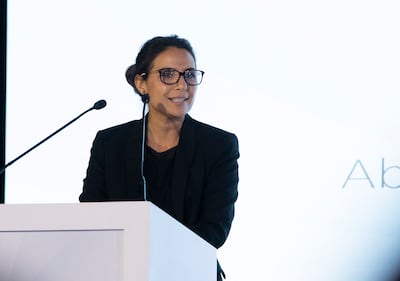Women continue to be excluded from peace negotiations and leadership positions, despite substantial evidence showing that they are vital to maintaining security and economic growth, experts said in Abu Dhabi on Saturday.
The comments came on the final day of the UN's International Conference on Women, Peace and Security, which was held under the patronage of Sheikha Fatima, Mother of the Nation and Chairwoman of the General Women's Union, starting from September 8.
The conference concluded with an urgent call for more female representation in peace processes, particularly in Arab countries.
Billion-dollar price of excluding women
“There is a cost to exclusion that can be easily quantified," said Susanne Mikhail, Regional Director of UN Women for the Arab States.
"In the Arab states, it’s about loss of peace because, according to UN Women studies, women’s participation increases the probability of a peace agreement lasting at least two years by 20 per cent.”

Data compiled by the UN shows women’s contribution to peace agreements resulted in them lasting 15 years or more, and they were 64 per cent less likely to fail.
“For a better future for us and our children and our grandchildren ― women need to be an integral part of the negotiation and mediation process,” said Ms Mikhail.
The UN research also found countries collectively lose about $570 billion annually as a result of peace talks breaking down or agreements not lasting.
"That’s a loss and it's been quantified. It's evidence,” she said. “Despite all the evidence, a majority of women have been kept out of national dialogues.”
The UAE's agenda has long since included women in its plans for peace and security, with the "Fatima Bint Mubarak Centre for Women, Peace and Security" established in June last year.
“Believing that the empowerment of women contributes greatly to achieving global prosperity and putting an end to conflicts, Her Highness [Sheikha Fatima] directed the establishment of the [centre] to reflect the state's keenness to build national, regional and global capacities in the field of women and peace and security, and to be an empowering nucleus for women,” said Hessa Buhumaid, Minister of Community Development.

"It comes as an affirmation and embodiment of the state's policy and approach laid down by the founder of the UAE, the late Sheikh Zayed bin Sultan Al Nahyan.
“It is an approach based on wisdom, moderation, balance, advocacy of truth and justice, and based on dialogue and adherence to international conventions."
UAE national plan
Sheikha Fatima also launched on March 30, last year, the UAE's national plan to implement Resolution 1325 issued by the Security Council related to women, peace and security.
The resolution specifically addresses how women and girls are disproportionally affected by violent conflicts and war, and recognises the critical role that women can and already do play in peace-building efforts.
In spite of the various agreements and plans and the UAE's unwavering commitment to the UN's resolution 1325, there were some challenges along the way.
"It should be noted that the UAE faced several challenges during the process of formulating the national plan, but the national plan team worked diligently to address the roots of the challenges," said Sheikha Dr Moza bint Tahnoun bin Mohammed Al Nahyan, adviser at the UAE's Ministry of Foreign Affairs.
The first challenge she said was "the limited understanding of government agencies and institutions involved in preparing and implementing the plan on achieving the goals of women, security and peace and how to link them to their work."
The second challenge, said Sheikha Moza, was the ability to track progress and make the necessary adjustments to the national plan.
"Therefore, a plan for monitoring and evaluating the progress of work has been developed... and to support the exchange of notes and lessons learned among the participating parties," she said.
"The UAE commends the outstanding efforts in launching this plan, and we stress that work continues and commitments on the national plan are essential for all government agencies and institutions in the country, and we are now working on the implementation phase of the medium and long-term goals of the plan in coordination with the actors around it."

